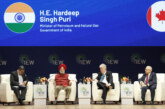By Dr Arvind Kumar
Women are intimately linked to water-related issues. Women are most often the collectors, users and managers of water in the household as well as farmers of irrigated and rainfed crops. Because of these roles, women have considerable knowledge about water resources, including quality and reliability, restrictions and acceptable storage methods, and are key to the success of water resources development and irrigation policies and programmes According to broad estimates, Women and female children spend more than 10 million people – years carrying water from distant sources every year globally. In Africa, 90% of the work of gathering water and wood, for the household and for food preparation, is done by women. On average women and children travel 10-15 kilometers per day collecting water and carrying up to 20 kilos or 15 litres per trip in some mountainous regions of East Africa, women spend up to 27% of their caloric intake in collecting water in India, women bear the burden of fetching drinking water in rural areas and if opportunity costs are taken into account, it would translate to about 150 million women days each year. This amounts to a loss of a whopping 10 billion rupees per year to the national exchequer.
To mitigate the water burden on women, a study by the National Commission on Women has suggested the following measures:
- Ø Restoration of conventional methods of water conservation like baolis, johads, ponds and tankas.
- Ø Introduction of rainwater harvesting.
- Ø Changing the cropping pattern from water intensive crops like paddy and sugarcane, to crops like millet and ragi, which consume less water.
- Ø In cities instead of Public-Private-Partnership (Privatisation of Water), Public-Public-Partnership (Public and Government) can be introduced as an alternative for coping with the water crisis.
- Ø Proper water conservation measures should be used and people should be trained on the techniques.
- Ø Panchayati Raj Institutions (PRIs) and NGOs should be involved in the management of rural water supply.
- Ø Women should be trained as water managers for better utilization of the resource.
- Future programmes and projects should be designed, keeping in view women as water users.
- Ø Government schemes should be implemented properly.
There is dire need of implementing these suggestions on priority basis to ameliorate the plight of women as well as improve water facilities, particularly in the rural areas of the country.




